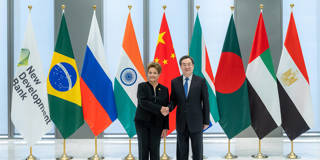Not only has the West failed to convince the rest of the world that it also has a stake in Ukraine’s defense, but this failure is emblematic of a broader shift. The sooner that the United States, Europe, and their allies recognize the limits of the post-1945 international institutions they established, the better off they will be.
BERLIN – When NATO leaders descend on Vilnius this month for the alliance’s annual summit, they will demonstrate that the organization, newly united behind support for Ukraine, is far from “brain dead,” as French President Emmanuel Macron infamously described it in 2019. But NATO’s new vitality belies a larger problem: the West’s failure to convince the rest of the world that it also has a stake in Ukraine’s defense is emblematic of a broader shift.
In a world of rapidly evolving power dynamics, a silent revolution is reshaping multilateralism and increasingly leaving the West and its institutions behind. To paraphrase India’s foreign minister, the West’s problems are no longer the world’s problems.
This development may come as a surprise to those who, in the immediate aftermath of the Cold War, had bet on the transformative power of the post-1945 global governance institutions. The West’s instinct was to emphasize the universalist nature of these institutions and expand their scope. The hope was that bringing even recalcitrant countries into the tent would make them less likely to want to burn it down. With enough time, the argument went, they would become what then-US Deputy Secretary of State Robert B. Zoellick called “responsible stakeholders.”

BERLIN – When NATO leaders descend on Vilnius this month for the alliance’s annual summit, they will demonstrate that the organization, newly united behind support for Ukraine, is far from “brain dead,” as French President Emmanuel Macron infamously described it in 2019. But NATO’s new vitality belies a larger problem: the West’s failure to convince the rest of the world that it also has a stake in Ukraine’s defense is emblematic of a broader shift.
In a world of rapidly evolving power dynamics, a silent revolution is reshaping multilateralism and increasingly leaving the West and its institutions behind. To paraphrase India’s foreign minister, the West’s problems are no longer the world’s problems.
This development may come as a surprise to those who, in the immediate aftermath of the Cold War, had bet on the transformative power of the post-1945 global governance institutions. The West’s instinct was to emphasize the universalist nature of these institutions and expand their scope. The hope was that bringing even recalcitrant countries into the tent would make them less likely to want to burn it down. With enough time, the argument went, they would become what then-US Deputy Secretary of State Robert B. Zoellick called “responsible stakeholders.”